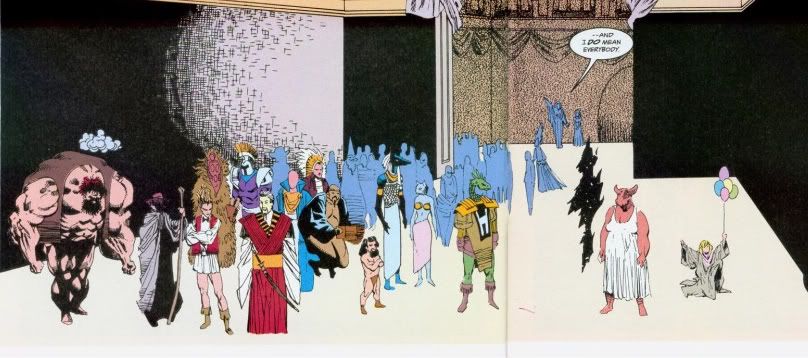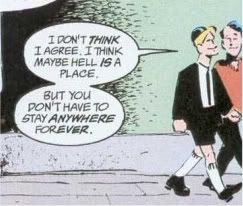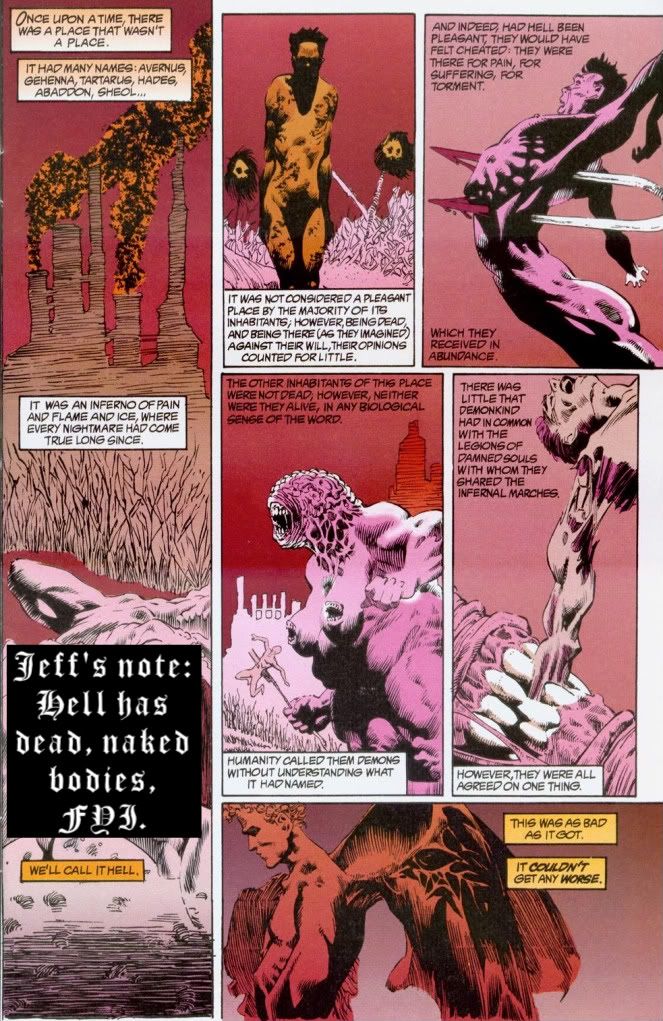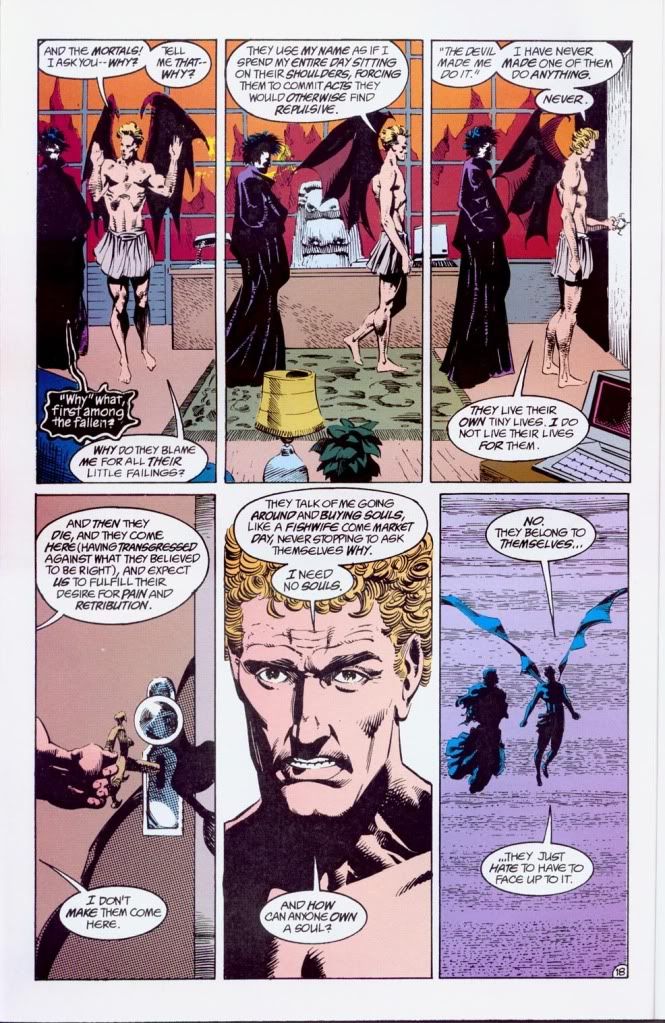Welcome to Comics Are My Religion, a look at theology through the lens of comic books. There are some basic ground rules about engaging in respectful dialogue about religion in this column. Be warned, if you haven’t read the series discussed below, you might want to go read it and come back, as this column may contain spoilers!

“I think Hell’s something you carry around with you. Not somewhere you go…They’re doing the same things they always did. They’re doing it to themselves. That’s Hell.” -Charles Rowland, Sandman #25
One of the most religiously-themed comics in the last 30 years has been Neil Gaiman’s Sandman from DC Comics’ Vertigo line. Gaiman’s innovative fantasy tome has been hailed as one of the best runs on a comic- ever. I have to agree. It’s one of the most unique books and has some of the best fantasy storytelling I’ve ever read. The other thing about Sandman is that it’s truly timeless. To think that this was written in the late ’80s is amazing because some of the things that Gaiman does would be innovative in today’s comic culture.
 In a nutshell, Sandman is about Morpheus, the King of Dreams, who in the beginning of the story is captured by mortals, escapes, and reclaims his throne. Many of the stories in Sandman are one-issue stories, depicting Morpheus’s interactions with mortals in the world of dreams. They are all very creative, some are scary, some are heart-wrenching. Morpheus is but one of a pantheon of beings who are in control of different realms dealing with the human condition–despair, desire, destiny, and even death. This creates an unlimited number of imaginative stories that deal in fantasy, hopes, and fears, as Morpheus and his brothers and sisters interact with the human world.
In a nutshell, Sandman is about Morpheus, the King of Dreams, who in the beginning of the story is captured by mortals, escapes, and reclaims his throne. Many of the stories in Sandman are one-issue stories, depicting Morpheus’s interactions with mortals in the world of dreams. They are all very creative, some are scary, some are heart-wrenching. Morpheus is but one of a pantheon of beings who are in control of different realms dealing with the human condition–despair, desire, destiny, and even death. This creates an unlimited number of imaginative stories that deal in fantasy, hopes, and fears, as Morpheus and his brothers and sisters interact with the human world.
This month, I want to focus on one story arc, although there are many that I would like to discuss in future columns, Sandman #21-28 entitled Season of Mists, as featured in The Absolute Sandman Volume 2 collection published by DC.
 Season of Mists begins with Morpheus gathering with his brothers and sisters and coming to the realization that he needs to rescue a mortal from Hell (a mortal he fell in love with in a previous story, and then banished after an altercation). When he arrives in Hell, he finds that Lucifer, the fallen angel and Lord of the realm, has decided to abandon Hell. He exiles all the souls from Hell, and gives Morpheus the key.
Season of Mists begins with Morpheus gathering with his brothers and sisters and coming to the realization that he needs to rescue a mortal from Hell (a mortal he fell in love with in a previous story, and then banished after an altercation). When he arrives in Hell, he finds that Lucifer, the fallen angel and Lord of the realm, has decided to abandon Hell. He exiles all the souls from Hell, and gives Morpheus the key.
This sets up an interesting dilemma for Morpheus. What should he do with Hell? Leave it closed up? Grant the dead and the demons who once existed there to come back? Morpheus struggles with what he should do, when he is visited by numerous parties who want to lay claim to Hell. Among the interested parties are Odin, Thor, and Loki of the Norse pantheon; Duma and Remiel, two angels of Heaven, who are there to observe the discussion; Azazel, a deposed lord of Hell, who thinks he is the rightful heir; Anubis and the Egyptian pantheon; Susano-O-No-Mikoto of the Japanese pantheon; a contingent from the Faerie world; and Lord Kilderkin and Shivering Jemmy, which are opposing manifestations of Order and Chaos, respectfully. All of these representatives (except the angels) vie for possession of Hell, and Morpheus must make the decision. I won’t spoil what happens, but it’s a very satisfying ending.

 In the middle of the main Season of Mists story is a one-issue tale about a boy who is the sole student over the holiday break at his private boarding school. As a result of Hell’s occupants being exiled, the dead rise and inhabit the school again. The boy attempts to live among these dead souls, but quickly finds that they bring suffering, torture, and pain, the very elements of Hell, along with them. In the midst of the story, the reader finds that Hell is not a place, per se, but a state of being.
In the middle of the main Season of Mists story is a one-issue tale about a boy who is the sole student over the holiday break at his private boarding school. As a result of Hell’s occupants being exiled, the dead rise and inhabit the school again. The boy attempts to live among these dead souls, but quickly finds that they bring suffering, torture, and pain, the very elements of Hell, along with them. In the midst of the story, the reader finds that Hell is not a place, per se, but a state of being.
What is Hell without the souls to inhabit it? Traditionally, the concept of Hell has many definitions. “The place of the dead” in many ancient religions, Hell became the place where unbelievers and unrepentant sinners reside for an eternity of punishment in Christian and Muslim doctrine. In many religions such as Judaism, Hell is more associated with a kind of purgatory, or waiting place, for souls to be judged and purified.

We typically think of Hell as a fiery and demonic place, which has been more informed by works of literature like Dante Alighieri’s Divine Comedy and John Milton’s Paradise Lost. Contemporary Christians, ironically, see Hell in light of these fictionalized versions rather than biblical ones. Biblical Hell is more of a state of being rather than a physical place. Perhaps the most physical representation in the Christian scriptures is in the Revelation to John, which is known to be an allegorical book rather than a literal one. Rather than dwell on the various facets of Christian concepts of Hell, which are varied among Orthodox, Roman Catholic, Mainline Protestant, and Evangelical Protestant factions, or any other religion, I want to focus on the concept of Hell as a state of being rather than a physical place, which is touched on in Sandman.
Hell can be better understood as complete and utter separation from the presence of God. Whether or not this is a consequence forced upon us by God when we do bad things or if it’s a natural consequence if one chooses to live life unhealthily, selfishly, or sinfully, is up for debate. But Gaiman plays with all these concepts (even the fictionalized ones) in Season of Mists. Hell is a physical place. In fact, it is all the things the various religious doctrines and stereotypical stories surmise. But once the souls have left Hell, are they free from it? Gaiman determines that if one continues to hang on to the things that sent him or her to Hell in the first place, he or she may never be free. In essence, the soul takes Hell with them.
What does this mean for us, the readers? As with the doctrines I have learned, Sandman reminds me that Hell is a reality, and one that is more of a “here and now” reality than a “then and there” one. People experience Hell every day. Victims of sexual, physical, and emotional abuse, sufferers of mental illness, abusers of drugs and alcohol, those who have suffered the loss of loved ones, those who cling to hatred and violence and bigotry–these are the residents of Hell. Whether this Hell has been thrust upon them, or whether they decide to remain in it, these people experience Hell. Many people experience a lifetime of it. The fact is that despite our beliefs and doctrines, no one cognitively knows whether or not Hell is a place in the afterlife, but we know what Hell feels like because we experience it in our lives. We feel it when we are disconnected and utterly alone. When we feel separated from our God, or our communities, we know what Hell is like. We need not hope for such a place in the afterlife, since we have plenty in our present reality.
In the world of Sandman, Lucifer makes an interesting point:

Are the concepts of Hell and the Devil realities that are put upon us, or ones that we create to justify our own sinfulness? Perhaps Hell is a future reality we create to punish ourselves, when in fact, by doing so, we are already experiencing Hell.
Perhaps Hell doesn’t have to be an eternal reality. Through the help of our respective beliefs, doctrines, and faith communities, we do not have to experience Hell forever.
Morpheus learns a valuable lesson at the end of Season of Mists. Upon damning his once-love Nada to an eternity in Hell, he ultimately regrets his action. Nada spends ten thousand years in Hell before Lucifer’s abandonment. After a tense scene where he apologizes to her, Nada forgives him. Thus, both are redeemed. Nada then gets to be reincarnated as a child, and lives life anew.
 In the religious world, we are quick to condemn one another to Hell. If others don’t believe the right things or subscribe to the right doctrine, we tend to want to group them and send them to an eternity of punishment. All the while, real people are suffering in Hell, and we do little to free them from it. Instead, we use our religion, the concepts that are supposed to teach us about love, freedom, and community, and use them to teach others about hatred, slavery, and loneliness.
In the religious world, we are quick to condemn one another to Hell. If others don’t believe the right things or subscribe to the right doctrine, we tend to want to group them and send them to an eternity of punishment. All the while, real people are suffering in Hell, and we do little to free them from it. Instead, we use our religion, the concepts that are supposed to teach us about love, freedom, and community, and use them to teach others about hatred, slavery, and loneliness.
Gaiman’s Sandman teaches us that Hell need not last forever. Forgiveness, love, and redemption are more powerful anyway, and can transform us, revealing a much more significant reality. May we all learn from this and emerge anew.
Jeff Jackson
jeff@comicattack.net

I found it really interesting in Season of Mists, that when Morpheus would go up to someone and tell them they were free (or ask if they wanted to be), they insisted that they stay in Hell and be punished, like it was their duty.
And the conclusion to the whole affair is actually rather disturbing.
It’s also sort of amusing that it takes Morpheus 10,000 years to regret and attempt to repent for punishing his lover (who really didn’t do anything wrong except tell him “no”), but then, when you’re immortal, 10,000 years is probably nothing.
“Instead, we use our religion, the concepts that are supposed to teach us about love, freedom, and community, and use them to teach others about hatred, slavery, and loneliness.”
Well said, Jeff. This makes me so sad. When people twist God’s teachings about love, forgiveness and understanding, and teach people to hate and condemn those around them.
Good post Jeff, I really enjoyed it. But then, Sandman is one of my favorite books.
Might I recommend a novel (sort of based on Paradise Lost) called To Reign in Hell, by Steven Brust.
Thanks, Kristin.
Yes, I found the “self-punishment” concept to be an interesting theological point, and one that is quite contrary to orthodox beliefs about Hell. However, folks like C.S. Lewis have played with this idea in books like The Great Divorce where people basically choose Hell based on their own self-centeredness. It has little to do with God sending people there, rather, our choice of self-punishment. Ironically, many of the Christian denominations propagate this idea by heaping guilt onto people, making folks internalize their pain to the point where no one feels like they can ever truly be forgiven. If we don’t have a concept of redemption, we may never release ourselves from the prisons we make.
I like that Morpheus and his siblings are just as flawed as human beings, yet have god-like powers and responsibility. It makes for interesting reading. The fact that it took Morpheus so long to realize his mistake really highlights that point. There’s a parable in that, as well.
If I remember correctly, Morpheus is just sort of musing over her for whatever reason, and it’s actually his sister Death who basically says “Hey, yeah, don’t you think you were kind of a dick about that?” Then he gets sort of offended, then gets over himself.
It’s like, 10,000 years ago he was some 15 year old punk, and a woman told him “no,” and he acted very petty and childish about it. Now he’s in his 20s maybe, and feeling a little bad about it. The whole affair is really sad, but sort of funny. His concept of time is nearly nonexistent, and he views himself quite a bit self-righteously. It takes Death to knock him down a few pegs.
Really, Gaiman created a very fascinating character in Morpheus.
Thank you for calling the Revelation of John an allegory as opposed to literal fact. The Evangelists who believe otherwise drive me insane, which I’m sure is their prerogative anyway.
“Gaiman determines that if one continues to hang on to the things that sent him or her to Hell in the first place, he or she may never be free. In essence, the soul takes Hell with them.”
Unless, of course, the soul doesn’t exist and ends up being something fabricated by man. Which is entirely possible.
“…but we know what Hell feels like because we experience it in our lives.”
Which is one of the many many examples why I struggle with believing in God in the first place; why do this to your people? Why the games? Why push this awfulness onto them in the name of “Free Will”? If the end goal is to spend eternity with God, and the religious faithful spend their lives trying to attain this, why the middle ground? Why the games? The end result is still the same so why make the suffering and god-awfulness exist in the first place? It doesn’t make sense to me and could be used as an argument AGAINST the existence of a loving God. Yet, somehow, the religiously charged seem content with accepting a thought or idea as justification for this world of atrocities.
I don’t.
“Instead, we use our religion, the concepts that are supposed to teach us about love, freedom, and community, and use them to teach others about hatred, slavery, and loneliness.”
And as a questioner of religion I have to ask: why can’t we learn all of these things without religion attaching itself to it?
Again Jeff- great article. And Sandman kicks ass.
You can learn all those things without religion attached to it. Religion is the framework, at least for me, it is. I don’t know a better way to learn about humility and love than the story of Jesus Christ. This is what makes me Christian. So I would say, yes, you can learn about love and humility and service to others without religion, but to me, the best example of this is a religious one.
Good questions, Andy.
Pingback: Tweets that mention Comics Are My Religion: Sandman & Hell -- Topsy.com
Interesting points made from this story. Of course anyone who is a christian and believes that Jesus is their Lord and Savior has these answers in the Bible and also with a good relationship with God.
But the Bible doesn’t answer anything, at least not factually.
First of all the word Bible actually means “little books” and this should not be forgotten; the Bible is a collection of separate books not meant to be read as a whole, but individually. Did you know that there were more than a dozen gospels but only four made it into the Bible? Why? Why omit the rest but spotlight a select four? It makes no sense!
And speaking of the four that were selected, they all contradict each other. Did you know that the Epistles of Paul NEVER mention Christ but they were written BEFORE the Gospels? Did you know that the Gospel writers were not Apostles (which is a popular belief) and wrote their works over 80 years AFTER Christ’s birth?
Not to mention how many times the Bible has been translated over the centuries let alone how many different ENGLISH editions exist, and it’s pretty easy to see that the Bible is one big inaccurate work of fiction. Except some are blinded by their faith. Seriously- take three English Bibles from separate publishers and reference the same passages and you will see that none of them are word for word the same…now imagine this process over centuries and through various translations and you will wonder how much of it is “fact” at all. Take this a step further: Imagine a world without internet, TV, or libraries. Now imagine documenting World War I today without using any modern technology and only oral tradition. How accurate do you think it will be?
And to claim that those people who believe in Jesus and the Bible “know” over those who don’t is a bunch of bunk. What makes you more intelligent than the next guy? The fact that you believe every word of the Bible to be true? If anything, in terms of logic and provable facts, reason would stand to argue that the other guy has a better grasp on reality.
So there really aren’t any answers in the Bible Billy, at least not provable ones. Those are all made up in your head and by the people who like to thump that giant sucker.
Andy, I know that your post is meant to be objective, but it’s a little disrespectful. If the Bible has answers for Billy, then there’s nothing wrong with that. Your comments about the Bible contain some fact in them, but you come at some different conclusions.
There are only four Gospels in the Bible because each Gospel creates a different theological portrait of Jesus, much like if 4 directors decided to film a movie about Jesus. They would include different scenes, different points, there might even be a different overarching theme in such films. None are meant to be historical fact, but theological claims. John’s Gospel has the Crucifixion happening on Thursday. Mark’s Gospel has the Crucifixion on Friday. Does that mean that neither is right? No, it means that John was connecting the Crucifixion to the Jewish sacrificial lamb, which Jewish families did regularly on Thursdays. The point wasn’t “which day did Jesus die,” but rather, “what does Jesus’ death mean theologically.” So there’s meaning in the differences. To reject them because they don’t add up is just as nonsensical as taking them completely on faith.
If you look at the Bible literally (which ironically, you are doing just as much as the “thumpers” you talk about), then it’s easy to take it as black and white. However, if you look at the Bible critically, looking at the historical context, the literary context, the forms of literature represented in the library of the Bible, then you find that it doesn’t mean that it’s “all wrong” but rather that there is a deep richness that can build faith.
Your questions are good ones, but please tone down the judgment, lest you become exactly what you’re critical of.
As always Jeff, you’re the voice of reason.
Re-reading my post I can see how it came off a little antagonistic, so sorry for that; it wasn’t the intention. The intention was to more or less try and raise awareness about certain things that many assume are fact, but after careful inspection may prove otherwise.
The argument “I know because I believe” is incredibly frustrating to me which is why I try to challenge it whenever possible.
You though, are one of the few religious faithful who do not take religious doctrine literally, but as a metaphor for how we should live our lives (which was the original intention of those little books in the first place!). And that’s very commendable.
: )
Most sane people understand that the text isn’t to be read literally word for word. It’s a guide, but the overarching elements are more important than the individual specifics, I think. Otherwise we’d all be stoning women for wearing pants (though they are still whipped in some places for just that), and killing children for being disrespectful.
I’m sure Jeff knows WAY more about the history of the text than I do, but I’ve seen some interesting things about how the texts were originally chosen. I wish I could remember what they said…. The History Channel is always showing all sorts of interesting things about that sort of thing.
But, it would also be silly to ignore how man has fiddled with things here and there. I guarantee the Church has made changes during history, so things would read the way they want. Whether that’s been reverted back since, I don’t know.
No problem, Andy. I just want to keep things civil and balanced here. All are welcome to share their beliefs from the most evangelical fundamentalist to the Andy Liegl’s and everything in between. My rule of thumb is that you can disagree, just don’t be disagreeable.
My rule of thumb is that you can disagree, just don’t be disagreeable.
The history of biblical interpretation is fascinating. As I told you earlier, Andy, I am teaching a class on it right now. It’s really challenging to our folks because most are used to reading the Bible based on their 21st Century worldview and that’s it. We’re opening doors for people who have never looked at the historical context or the literary context, and it’s blowing their minds! Fun stuff indeed!
The serious reader of the Bible needs to realize that even the tiniest details, discrepancies, and differences have major theological ramifications. It’s important to dig deep into it enough to see those differences, and come out with a better understanding. For some, this will negate the “truth” of the Bible. For others, like myself, it only enhances the meaning and the message. For still others, they won’t even bother to dig, which is frustrating for me personally.
I wish I had the History Channel, Kristin! I keep missing all the good stuff!
One thing I do know about religion and faith is that I’ve personally walked on both sides of it and until someone does, it’s quite difficult to understand a lot of things in the Bible or it’s teachings. Some things are not really translateable but when you belive that when you die you’ll have the opportunity to ask God these questions, it makes things easier to comprehend. Faith can go a long way my friend.